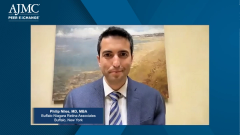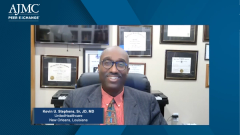
Using Anti-VEGF Biosimilars for the Management of Wet AMD
Philip Niles, MD, MBA; Nicholas G. Anderson, MD; Kevin U. Stephens, Sr., JD, MD; and Jim Kenney, RPh, MBA, comment on safety and cost considerations for the uptake of anti-VEGF biosimilars such as ranibizumab and discuss the impact on the future treatment landscape for wet AMD.
Episodes in this series

Jim Kenney, RPh, MBA: I think what’ll be interesting is that we have, as you’ve mentioned, new agents coming, other anti-VEGF biosimilars are on the horizon, ranibizumab specifically. A biosimilar will be expected sometime in mid-2022, perhaps as early as June. How do you see the biosimilar ranibizumab affecting this space?
Philip Niles, MD, MBA: That’s something that our field has been looking toward with uncertainty for some time. It could be very impactful and potentially in a very positive way. It’s just difficult to know. Biosimilars have been around in other fields for a long time. Biosimilars have been around since about 2010 or so, and there are maybe 4 originator drugs that have biosimilars, which doesn’t feel like that many. I think there are just a lot of barriers to adoption for biosimilars. In the retina field, it’s going to be interesting to see how effective they are. They might be equally effective, in which case they might be taken up by our field en masse, or they might not be as effective and we might be a bit adverse to using a newer therapy. It’s hard to know at this time until it’s more widely available, but it’s definitely something that people are looking forward to as something that could change our field potentially.
Nicholas G. Anderson, MD: I agree completely with Dr. Niles. I think it’s very exciting to have these new medications come to market. When we’re working with the eye, there are always safety considerations because you’re not just looking at the active ingredient, but other components like the carrier can be absolutely critical in the safety of the medication. Again, are we going to see any safety issues in real-world data? As we saw with Beovu [brolucizumab], it looked very safe in the clinical trials, but then as it gained more widespread use, we started to see some complications. That’s just something we’ll have to watch for, but I’m very excited about them, we’ll just have to watch for any safety considerations.
Jim Kenney, RPh, MBA: Dr. Stephens, any thoughts on the biosimilars in general, how you might approach those?
Kevin U. Stephens, Sr., JD, MD: The problem we have is that without clear guidelines and standards and the FDA approval, it becomes a very difficult space to work in because of that. We use “experimental, investigational,” and that’s commonly used when it is not accepted as a standard of care. You have off-label usage and those kinds of things. Again, with that, it’s a very tough space, and I think we have to work together. We have to partner together. We have to look at it. The data may be not as tight or solid as you would like for it to be, but in many cases, patients have no other choice. That’s the best choice for them. As I think Dr. Anderson said, patients typically don’t read the book on their disease processes. They don’t follow line-by-line, verse-by-verse, word-by-word. That’s the reason you have to put some variability in your processes so that you can do that.
Nicholas G. Anderson, MD: I think the pricing’s going to be very interesting. We’ve seen these medications, we know they’re all coming down the pike. We’ll see what the efficacy and safety is. What are the manufacturers going to do? Are they looking to say, “Hey, some of these branded drugs are an absolute cash cow. Let’s cut our price by 5% and make a mint here?” Or are they going to say, “Hey, one of the biggest challenges we face in managing these medications is cost. The costs are absolutely astronomical to society. Can we really get a foothold in and have a safe and effective treatment at a much lower cost that everyone could benefit from?” I think until we see that pricing data, it’s going to be an unknown in terms of uptake.
Jim Kenney, RPh, MBA: Yes, absolutely. I think the plans certainly are going to focus on that as well. I think what’s interesting is we have biosimilars, which are going to be manufactured using approved FDA bioreactors, and so forth. Then you’ve got compounded Avastin [bevacizumab], which is made in a compounding pharmacy. So there’s a bit of perhaps a safety or a quality risk, if you will, with things that are compounded. It’ll be interesting to see if that safety concern with biosimilars comes to mind from the ophthalmology community. I know initially with the autoimmune biosimilars, there were concerns from the GI [gastrointestinal] community, specifically with infliximab, whereas the rheumatology community was pretty comfortable with it. Then based on some studies that were done, everybody felt that, OK, there really aren’t any safety concerns or efficacy concerns with these. Adoption can be a challenge, certainly. Then the product that’s purchased by the provider and used, that adds another twist to the equation.
Kevin U. Stephens, Sr., JD, MD: Yes. I want to say that November 5, 2021, CMS [Centers for Medicare & Medicaid Services] sent a memo to the Medicare Advantage Plans to prevent the use of that step therapy protocol. That’s another big bug in the rug, if you will.
Philip Niles, MD, MBA: I agree. It’s going to be so important that we get this right; 2022, this is the year when a lot of the biosimilars are coming out. We’re going to find out pretty soon how this is going to go down. It’ll be interesting to see. I think the pricing is going to matter a lot. I think coming from a position of strength with having a good relationship between retina doctors and payers is also going to matter a lot in navigating these waters together. It’ll be really interesting to see how the pricing works.
Transcript Edited for Clarity
Newsletter
Stay ahead of policy, cost, and value—subscribe to AJMC for expert insights at the intersection of clinical care and health economics.







